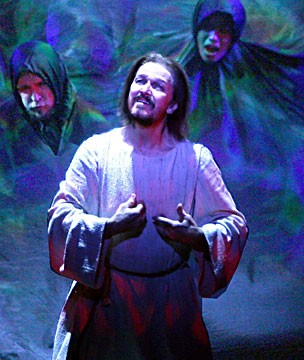
- J.C., submitted photo.
Live performance
at HSU's Van Duzer Theatre, Jan. 8.
The night lurked, heavy with portent, as a sickly white substance filtered through the theater's airspace and settled ever so lightly about the seated audience, who breathed in and breathed out. In. Out. The lights were still on, so this was odd: Every particle of mysterious white dust visible to the frightened eye; heaven revealed too soon, too fast. Some entered the packed theater with apprehension: "What is that white stuff?" they asked an usher. The usher replied, "I don't know. I hope it goes away soon."
Ah, has it been that long? That long since we enjoyed a genuine rock opera starring heaven above and the Lord's son on Earth, below? With strobe lights (those came later, when the lights were off) and fog effects? Maybe. The audience at the Tuesday night showing of Jesus Christ Superstar — lyricist Tim Rice's and composer Andrew Lloyd Webber's famous rock opera, first performed on stage in 1971 and now once again touring the land — leaned on the older side of life, predominantly white-haired and many accompanied by mobility aides. And even the superstar of the show — the amazing, power-screeching Ted Neeley — looked aged (and wise, natch) as he performed perfectly and for the umpteenth time in the role of Jesus.
Which is all to say that though the show was as rocktabulous as it ever was and incredibly fun and moving — I saw tears in more than one viewer's eyes — the age of Neeley (twice that of his character's) mingled incongruously with the youth of his costars and some of the funkster musicians in the orchestra pit, and with the evergreen story itself. The juxtaposition had the deliciously time-bending, if unintended, effect of making it seem that Jesus himself was up there on stage, having come back at last and then somehow gotten roped into starring as his younger self in this old-school rock opera. He was real. His wisdom was accessible in the lines of his face and the droop of his mouth and the glinty patience in his eyes. His repeated song, "Then I was inspired, now I am sad and tired; it's been three years, but it seems like 30 years" couldn't help but have double meaning. It has been 30 years.
In light of Neeley-Jesus' age, the hopeful eagerness and fawning of the pastels-clad, clapping and singing apostles and their women made more sense. The gentle, protective nurturing of Mary Magdalene (a show-stealing Tiffini Dodson, lush in her blatant red dress) came across more as daughterly affection than lover's possessiveness. And his mixture of love and distrust of Judas (Living Colour's boisterous, deeply talented Corey Glover) seemed fatherly. Glover, in turn, while himself older than most of the other performers and therefore also mantled with the authority of age, next to Jesus seemed less a doubting friend and more a son betraying his father in one of those massive generation-gap misunderstandings. Helplessly, pulled along by fate and youthful arrogance, he betrays his friend, leader, father-figure — then suffers the death of his idealism and is induced to hang himself by Caiaphas (Darrel Whitney, whose creaky-deep, eerie voice digs into your bones, seeking marrow) and the priests, clothed in black, who have killed Jesus.
After the show, out in the strangely mild January night, a gray-haired man said to his gray-haired companions, "I liked the second half better than the first half." A wag walking past — just a hint of gray at his temples — overheard and muttered, "That's what people say about the Gospels, too. That's because there's more action. Jesus is whipping the money changers, facing Pilate, giving speeches."
Just like us non-kids. Going to the rock opera. In the second half of our lives. Sucking in some danger, exhaling joy and fear and relief and wonder. Simultaneously reliving our youth and preparing our next wise and fiery speeches. Right?
Comments